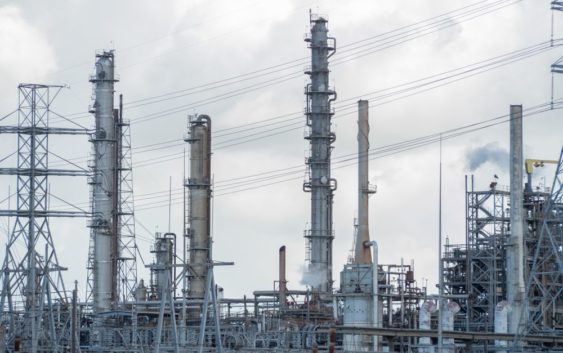- What to do during a tornado warning
- Storm damage reported after possible tornado in Union County
- Live updates: Severe thunderstorm warning issued for Durham & Chapel Hill; reports of possible tornado damage near Charlotte
- Storm damage reported in Union County, NC
- Live updates: 1st tornado warning of the day issued for Forsyth County
Weekly Oil Market Crash Update: Tropical Storms Add More Challenges Amid Coronavirus Downturn

An oil and gas refinery near La Porte, on Aug. 28, 2020.
Once again oil producers in the Gulf of Mexico are preparing for a major storm.
Reuters reports that companies have already started evacuating offshore oil platforms as Hurricane Delta strengthened to a category 4 storm in the Caribbean Tuesday.
Ahead of Hurricane Laura in August, offshore oil production in the Gulf dipped by more than 1 million barrels a day as refineries shut down to prepare for the storm. This is on top of an already tumultuous year with historically low oil prices coupled with depressed demand due to the coronavirus.
Delta could make landfall in the U.S. later this week. Refineries are meant to withstand hurricane-strength winds, but storm surges and saltwater can be especially damaging. Stopping and restarting a refinery is an intensive process that normally takes two or more weeks, and speeding up the process brings up safety concerns.
According to federal data, more than 45% of U.S. refining capacity is along the Gulf Coast, and more than half of natural gas processing plant capacity.
Back in 2017, Harvey knocked out nearly a quarter of U.S. refinery capacity.
Also this week, internal documents reviewed by Bloomberg News show ExxonMobil had plans to increase CO2 emissions in enormous quantities.
Exxon’s plans for development would mean increasing emissions 17% by 2025, according to Bloomberg. That’s an additional 21 million metric tons of carbon dioxide per year, which far outpaces the company’s pollution-reduction programs.
The information was just made public, but the plans were drafted before the coronavirus downturn.
In a statement to Bloomberg, the company said the projections are an early assessment and don’t include additional emission mitigation efforts.
Also, Occidental Petroleum sold its onshore assets in Colombia to The Carlyle Group for around $825 million. The Houston-based oil company is carrying more than $30 million in debt, much of it resulting from the purchase of Anadarko last year.
Overall in 2020, Occidental has announced more than $2 billion of divestitures. Many of those deals are expected to close by the year’s end.
And some good news this week for oilfield services workers: the sector added back 1,400 jobs in September, according to the industry group PESA. Overall, oilfield services have lost more than 106,000 jobs since the pandemic started. Texas is the hardest hit state, shedding more than 59,000 jobs in the sector.
Subscribe to Today in Houston
Fill out the form below to subscribe our new daily editorial newsletter from the HPM Newsroom.